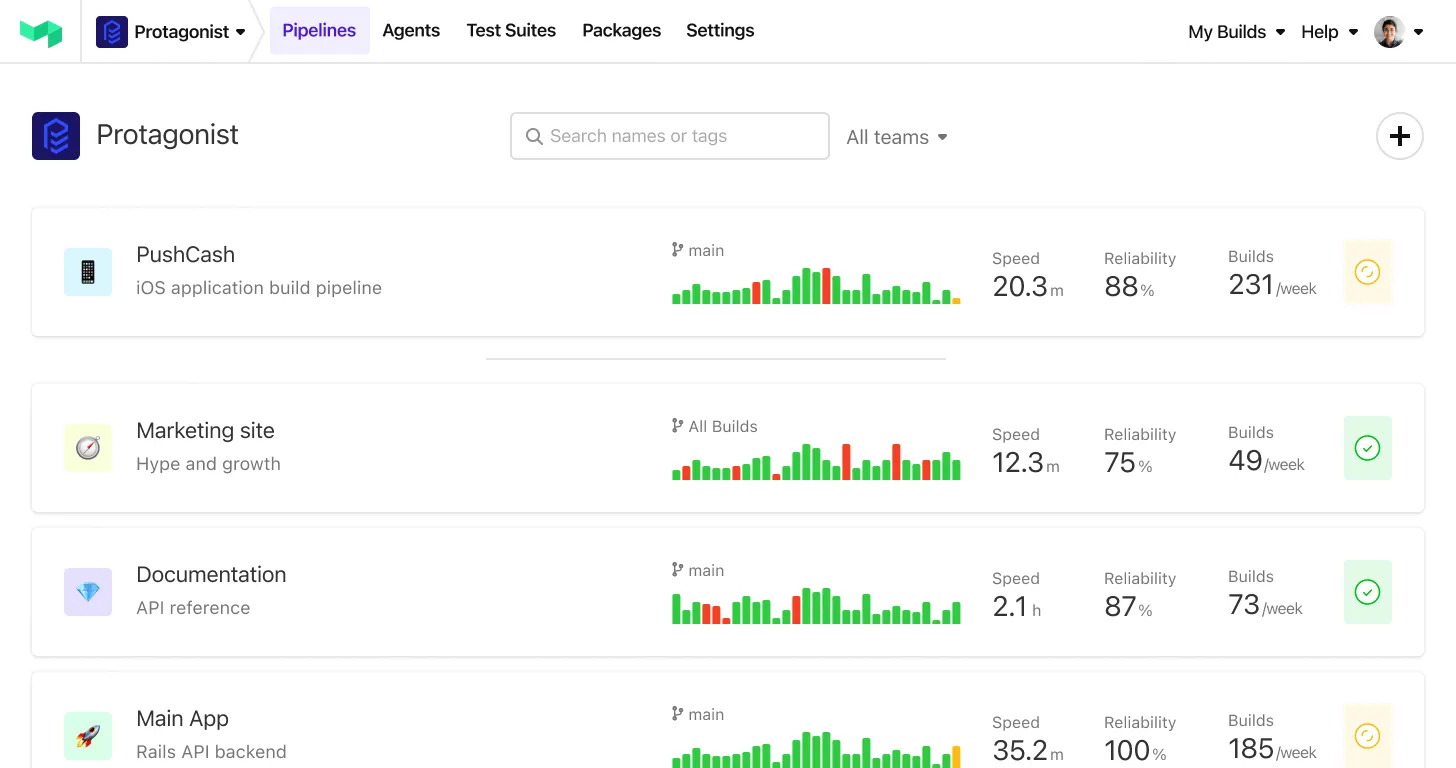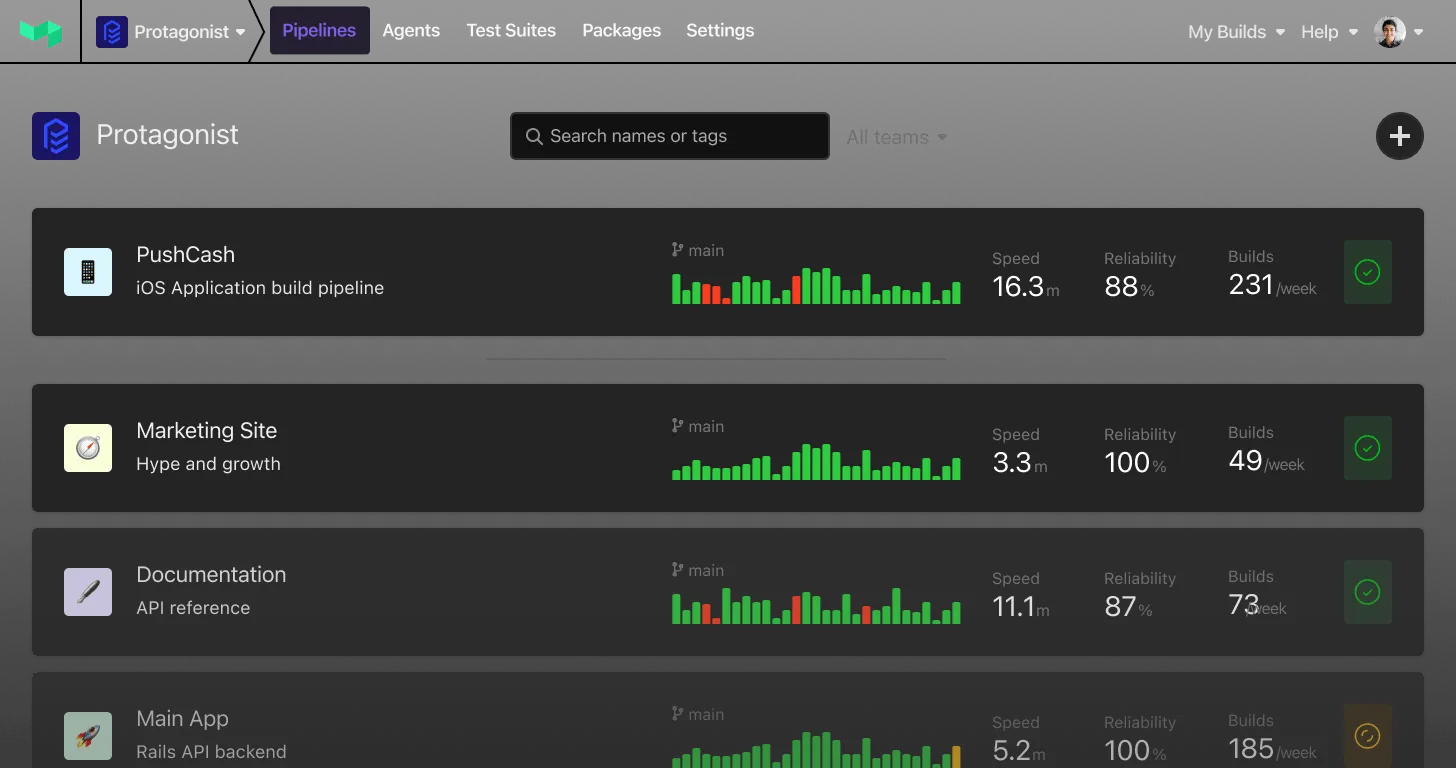Eager Concurrency
Traditionally, concurrency groups enforce strict ordering of the jobs within them. Concurrent jobs will be limited to the number set for the group, and will only start executing in the order they were created. 📝
However, sometimes you only need the limit, and it's fine for eligible jobs to run in whatever order their dependencies allow. 🏃🏻♀️
Which is why we've added a concurrency_method step attribute you can set to 'eager'. This will allow any job, up to the concurrency limit, to start as soon as it's eligible, regardless of creation order. 🔀
As an example:
1 2 3 4 5steps: - command: echo "Using a limited resource, only 10 at a time, but we don't care about order" concurrency_group: saucelabs concurrency: 10 concurrency_method: eager
For more information, check out our guide to Controlling Concurrency.
Libby
Agent v3.32.3 and AWS Elastic Stack v5.6.0 release
The 3.32.3 version of the buildkite-agent and the 5.6.0 version of the AWS elastic stack are now available.
The 3.32.3 Agent release has added:
- Support for cross-region artifact buckets
- Improved error logging around AWS Credentials
- Logging to the artifact upload command to say where artifacts are being sent
The 5.6.0 Elastic Stack release has added:
- Cross-region secrets bucket support to git-credentials-s3-secrets
- AssumeRole support in the ECR Login plug-in
For full list of additions, changes, and fixes, see the buildkite-agent changelog and the elastic-ci-stack-for-aws changelog on GitHub.
Libby
New Build Artifact Retention Limits
From 1 October 2021, build artifacts hosted by Buildkite will be retained for six months from time of upload, after which they will be deleted. Artifacts uploaded before 1 April 2021 will also be deleted at this time.
Previously, build artifacts were retained indefinitely, which means we're currently storing over 7PB of data 🤯📈
Custom-hosted build artifacts are not affected by this change, and remain available to any customer who wants more control over their retention.
As always, you can reach out to us with any questions about this change.
Paul
Elastic CI Stack for AWS v5.5.0 released ☁️
We've released v5.5.0 of the Elastic Stack CI for AWS ☁️
Included in this release:
- Template validation rules for the Buildkite Agent token
- Secret redaction in build logs
- Support for the
pre-bootstrapBuildkite Agent lifecycle hook
You can read the full release notes on the v5.5.0 release on GitHub.
Fred
Agent v3.32.0 released 🦾🤖
We've released v3.32.0 of the Buildkite Agent 🦾🤖
The release adds a new pre-bootstrap lifecycle hook which can accept or reject jobs before environment variables are loaded, providing an additional layer of security and control over your Buildkite agents. See the documentation on lifecycle hooks for details on how to use it.
You can read the full release notes on the v3.32.0 release on GitHub. To upgrade, follow the instructions in the Agent docs.
Fred
One-shot agents with the acquire-job flag
For teams running their own compute scheduler or those needing single-use agents, we've added the --acquire-job flag to the Buildkite Agent 🧰
With this flag, agents are mapped 1:1 with jobs. This makes them perfect for folks using a system like Kubernetes, Nomad, or ECS, or anyone who wants a clean-room environment.

To get started, pass the --acquire-job flag with the job ID to the buildkite agent start command. When you start an agent with this flag it will run the job then exit rather than polling for more work.
You can use acquire-job with agents v3.17.0 and above, anywhere that the agent can run 🏃🏻✨
For details on how to use the flag, see the agent cli documentation on Running a single job.
Harriet
HMAC signed webhooks
For teams wanting to add an extra layer of security to their webhooks, we have just added the option to include HMAC signatures with your Webhook Notification services 🔐
You'll find the HMAC signature option under the Token section when editing or creating Webhook Notifications.
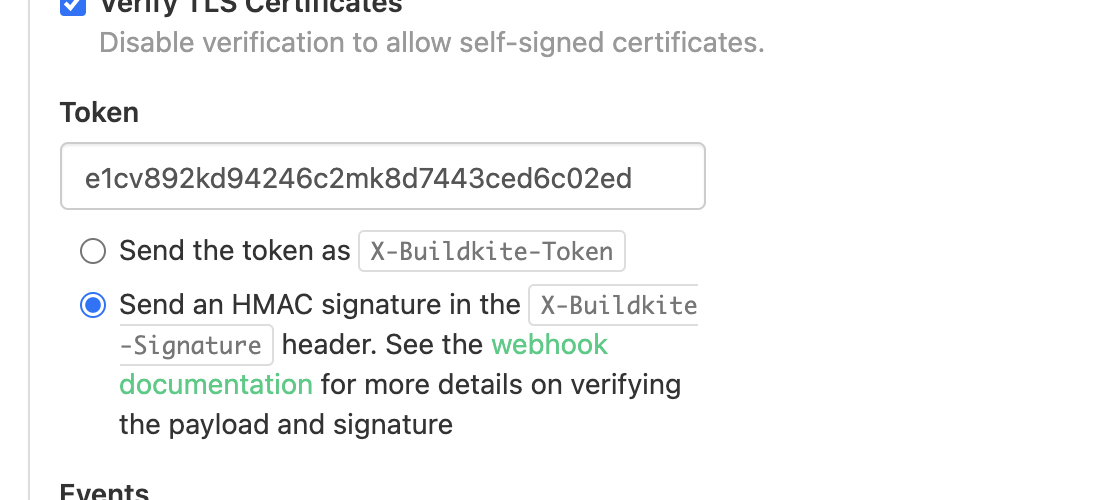
For more information on verifying webhook signatures and defending against replay attacks, see our Webhook API documentation.
Harriet
Buildkite CLI v1.2.0
We've released v1.2.0 of the Buildkite CLI 📎💪🏼🪟
Included in this release:
- The
bk build createcommand now has a--meta-dataargument, for setting Build Meta-Data when creating a build - Running local builds (via
bk local run) now works on Windows - An improved GitHub authentication flow
You can read full release notes on the v1.2.0 release on GitHub
To upgrade, if you're using Homebrew on a Mac run brew upgrade bk, otherwise download the latest release for your platform from the GitHub release page.
Libby
Conditional webhooks
For complete control over when to trigger builds, use conditional expressions to filter incoming webhooks 📥
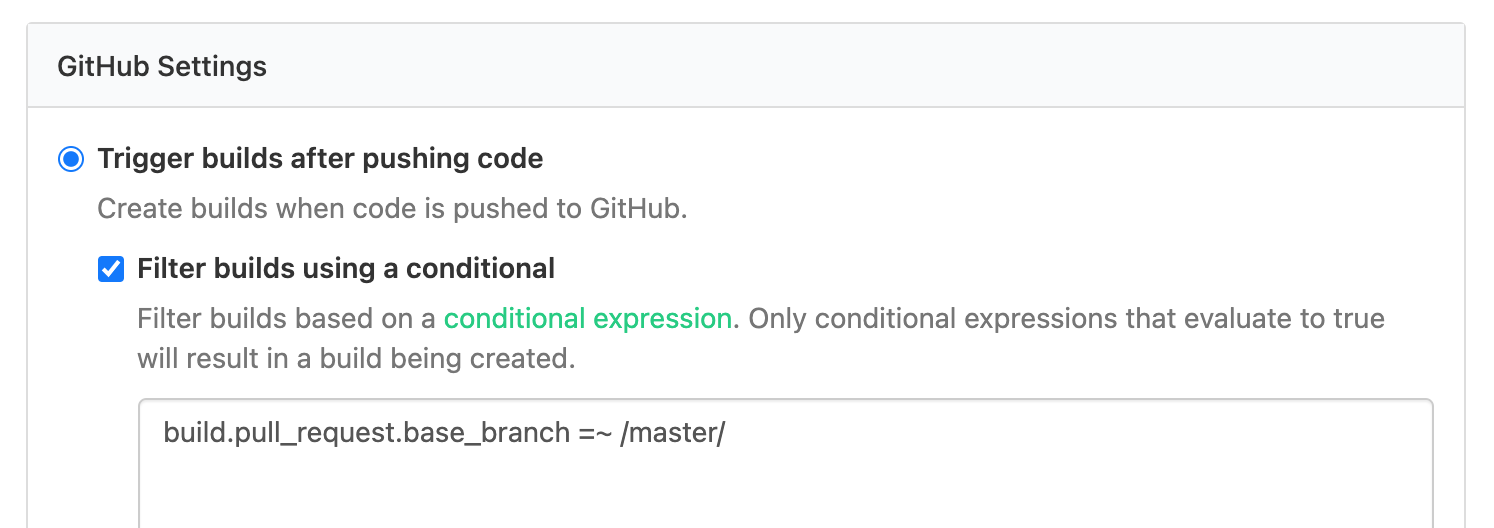
Build filtering with conditionals is available with any repository provider. You can add a conditional on your Pipeline Settings page or via the REST API 🔀
For more information on supported conditionals, check out our guide to Using Conditionals.
Harriet
Terraform Provider v0.4.0
The latest release of the Buildkite Terraform provider adds buildkite_meta: a data source providing the IP addresses Buildkite uses for webhooks ✨

The new data source can be used in your terraform project to dynamically set firewall and ingress rules, allowing in traffic from Buildkite 🚦
You can find a code sample and attribute reference in the Buildkite provider docs on the Terraform Registry. For more detailed information about the addition, check out the v0.4.0 release on GitHub.
Harriet
PagerDuty Change Events Integration
Send Change Events to your PagerDuty services whenever a build completes 🚨
Filter Change Events notifications with conditionals to make sure you're sending only the information your team needs

The Buildkite integration can be installed from the PagerDuty Service Directory 📚
Find the step-by-step guide to sending PagerDuty change events in our PagerDuty integration guide.
Harriet
GraphQL API state change for broken jobs
To simplify querying jobs with GraphQL we're shipping a fix to make sure broken jobs return a "BROKEN" state 🚦
Starting on Tuesday, 1st June 2021 at 00:00 UTC broken jobs fetched via the GraphQL API will return BROKEN instead of SKIPPED.
If you have scripts or other clients of the GraphQL API that rely on jobs returning a SKIPPED state then you will need to update these to accept the BROKEN state as well.

When fetching jobs from our REST API, broken jobs already return a state of BROKEN and will continue to do so.
If you need this switch made for your organization prior to 1st June 2021, please reach out to support@buildkite.com 👋🏻
Samuel
Announcing the Buildkite Newsletter
We've had a lot to talk about at Buildkite lately! We relaunched our blog, we've been updating and revamping our documentation, and have a ton of upcoming projects, customer stories, and tutorials we can't wait to share.
If that sounds like a lot to keep track of, we've got you covered! We're launching a 📰 newsletter 📰 to provide curated highlights, so you can stay in the know whatever your schedule ✨
Sign up here and you'll get a handy digest of our favorite features, updates, and blog posts delivered directly to your inbox 🗞📬🚀
For the latest news as it happens, this changelog will remain your one-stop source for Buildkite updates. You can also check out the blog and our docs directly to stay up to date on all things Buildkite 💚
Nick
Keep your secrets safer
Nobody likes accidentally leaking secrets in a build log. The Buildkite agent can now redact secrets present in your environment variables before they are uploaded to your logs 👷🏻
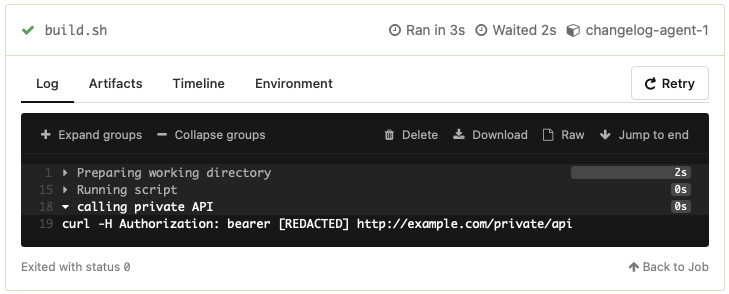
Turn it on for your agents, and add your custom variable patterns.
Thanks to Buildkite customer David Baggerman for doing the initial work on this feature 💚
Sam
New in the Buildkite Agent: Remove a build annotation
With the release of v3.28.1 of the Buildkite Agent, we've introduced a new command to remove existing annotations from a build 📝🚫
buildkite-agent annotation remove removes an annotation entirely, where previously you could only blank their content by passing an empty string to buildkite-agent annotate.
This allows for some creative uses like showing bits of context while builds, tests, deployments or lints run, and removing them from view when they're no longer relevant.
We're looking forward to hearing about what you make with the extra annotation abilities 😄🎉
Jessica
Datadog tracing for CI builds
For teams needing detailed observability in their CI/CD pipelines, we've recently released support for configuring Datadog as a tracing backend on the Buildkite agent to help monitor build and job metrics 🕵🏻
Huge thanks to our open source collaborators 💚
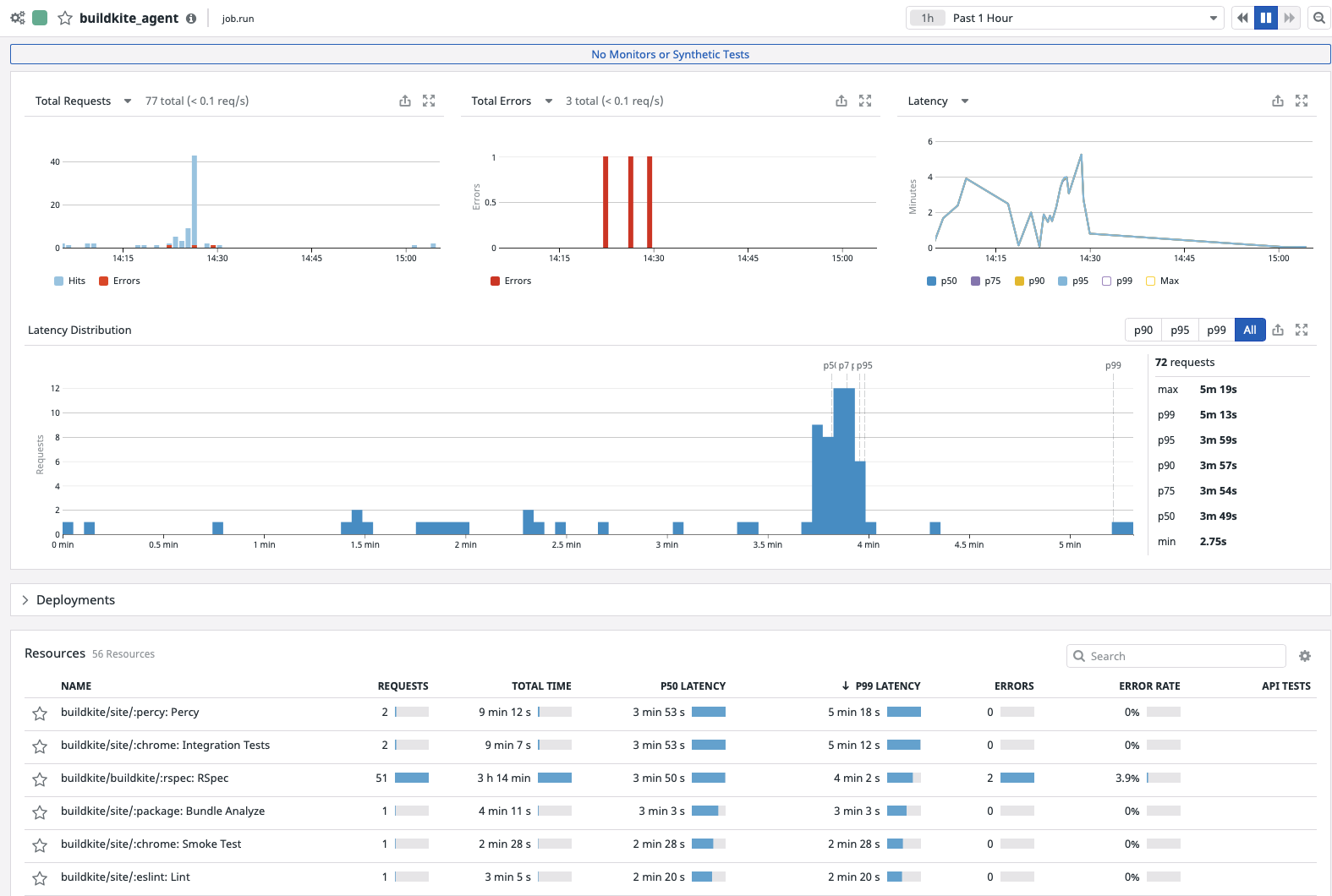
To get started, install the Datadog Agent on your Buildkite Agent machine(s) and configure the following environment variable: BUILDKITE_TRACING_BACKEND="datadog"
For more details, check out the agent configuration docs.
Chloe
New outbound IP addresses
To support customers with inbound network firewalls, Buildkite's Meta API lists the IP addresses that Buildkite uses to send outbound traffic such as webhooks and commit statuses.
To improve network resilience, new IP addresses were added to the Meta API earlier this month. If you use network ACL/firewall rules to allow-list traffic from Buildkite, these should be updated immediately.
During the week of 2021-04-19 traffic will intermittently be switched to the new IPs for short periods as a low-impact method of uncovering issues. During the following week of 2021-04-26 outbound traffic will be permanently switched to the new addresses.
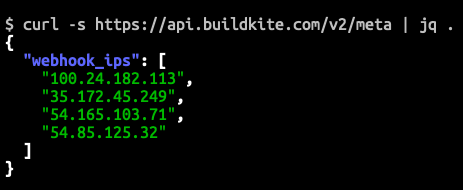
Paul
Official Buildkite Terraform provider :terraform:
Folks using Terraform to manage their infrastructure, great news! We've published an official Buildkite provider to the Terraform Registry 

For details of the configuration syntax and supported resources, check out the official docs on the Terraform Registry.
A big thanks to Buildkite customer Jarryd Tilbrook who developed the initial version of the provider and was happy for us to pick it up 💚
James
Build only branches, tags, or both
If you only want to build tags, you can now optionally switch off building branches 🚦
We've added a new setting: Build branches that is on by default for new pipelines. To only build on tags, disable Build branches and ensure that your Build tags box is checked:

You can find the Build tags and the new Build branches setting in your pipeline's Repository settings when using GitHub, GitHub Enterprise, Bitbucket, or Bitbucket Server.
Juanito
AWS Elastic Stack support for ARM instances :rocket:
We've heard that some Buildkite customers are considering ARM in production, so we've made sure that Elastic Stack for AWS v5.1.0 can help you get there ✨
v5.1.0 adds support for the following AWS instance types with an ARM-powered Graviton CPU:
m6g.*m6gd.*t4g.*a1.*c6g.*c6gd.*r6g.*t6gd.*
To use these instance types, follow the upgrade guide for v5.1.0 and set your InstanceType stack parameter 🚀
James
Start turning complexity into an advantage
Create an account to get started with a 30-day free trial. No credit card required.
